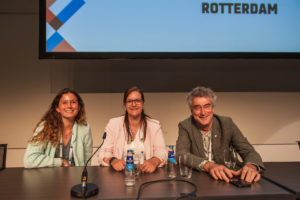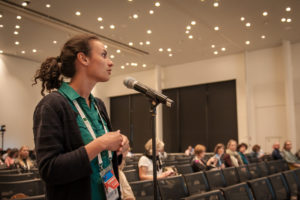Libraries Empowering Climate Action: Ideas generated during WLIC 2023 Climate Session
31 August 2023
IFLA challenged delegates at the 88th World Library and Information Congress (WLIC) to think boldly about their role in tackling the climate emergency in the open session: How Can Libraries Accelerate Climate Empowerment?
Reaching beyond the library
IFLA’s WLIC session invited two speakers working in climate and sustainable development policy in the Netherlands to join a discussion with library professionals on action for climate

empowerment. Lenneke IJzendoorn, the Dutch ACE Focal Point, and Sarah Oey, the UN Youth Representative on Sustainable Development for the Netherlands, joined Erik Boekesteijn from the National Library of the Netherlands to discuss climate empowerment through the lens of library engagement.
Particularly impactful was hearing youth perspectives on the most pressing challenges related to the climate crisis. For example, speaker Sarah Oey highlighted the challenge of making complex scientific topics understandable for a wider audience. She noted that topics like air quality, which have a huge effect on public health, can be difficult for many to understand and engage with.
How Can Libraries Accelerate Climate Empowerment?

This was the question posed to the delegates both in the room and online. Using mentimeter, IFLA sought broad input and bold ideas from participants.
Here is a selection of ideas collected during the session on actions which combine education, collaboration, and a dash of innovation to help all people understand the climate emergency and take action.
Science Engagement and Education:
- Organize awareness workshops with all segments of the public to educate and inform them about climate change.
- Incorporate climate issues into information literacy instruction.
- Offer citizen science programmes at libraries to engage public participation in science.
- Include science engagement and citizen science training in LIS (Library and Information Science) education.
- Connect science communicators with community members for co-production of resources on climate change and positive action.
Community Collaboration:
- Create communities within libraries to have an impact on climate change, such as through programming, activities, or discussion groups.
- Humanise the climate crisis, localise its impact, and focus on solutions.
- Work together with youth organizations to involve the younger generation in climate action.
- Build community links and collaborate with other cultural and local organisations to provide consistent advice and information and promote collaboration
- Use library space for panel discussions, workshops and other activities that involve a variety of voices and perspectives.
Modelling Sustainable Behaviour:
- Model sustainability in library operations, building design, maintenance, and interactive displays.
- Communicate what the library is doing for climate action with the community.
- Employ environmentally-friendly practices, such as eco-friendly copying and using solar energy in libraries.
- Provide hubs for concrete collaborative action on climate-related projects.
- Participate in campaigns related to human rights and a healthy environment.
Innovative Approaches:
- Gamify learning and engagement to make climate-related activities fun.
- Explore concepts like “Library of Things” where users share items.
- Use big data repositories to provide data stories related to the climate crisis.
Overall, responses underscored the importance of education, community engagement, collaboration, and setting an example through sustainable practices as effective strategies for libraries to promote climate action.
Explore all of the input gathered during the session here: WLIC 2023 Climate Session Mentimeter Results
Collaboration is key
Delegates were then challenged to identify partners with whom they could engage on climate action initiatives.
Science communicators, researchers, journalists and groups like Scientists for Future were popular options. Local groups, activists, and Indigenous communities were also noted as being important stakeholders that libraries can help platform. Engaging with universities, students, youth groups, and local and regional policymakers were also identified as key groups with whom to engage.
The power of reaching out to these groups, taking the initiative to make contact, introduce your activities, and suggest collaboration, was noted as being an effective way to establish such links.
Measuring and communicating impact
Finally, delegates were asked how libraries could measure impact, evaluate, and share success stories.
Ideas included quantitative metrics, such as measuring greening practices by money saved, tracking carbon footprint, and measuring participation and attendance in activities.
Qualitative metrics were also noted as being impactful, such as recording personal testimonies, stories about changed behaviors, interviews and storytelling.
To start making their impact know, libraries and library associations were invited to share their experience with climate action, communication, and education in a survey. This survey is the first phase of an IFLA HQ initiative to help measure how libraries are making an impact on climate education and communication on a global scale – find out more here.
There is still time to contribute!
- Are you participating from the perspective of a library? Take the Library Survey here.
- Are you participating from the perspective of a library association? Take the Association Survey here.
Questions? Contact us: [email protected]